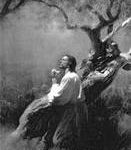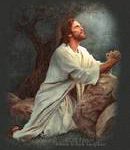...In the seventh month, on the tenth day of the month, you shall afflict your souls, and you shall not do any work … For on that day he shall provide atonement for you to cleanse you from all your sins before the L-RD. -Leviticus 16:29-30 <
This year the holiday of Yom Kippur (to atone) began in the evening (moonrise) of Tuesday, the 25th and ends the next moonrise. Technically, this occurs yearly on the eve of the 9th and 10th of the month of Tishrei. Jewish calendars follow a lunar year, not solar, as does much of the world.
 The Hebrew Day of Atonement is the most important holiday of the Jewish year. It is a holy day for Jews, set aside for the “affliction of the soul” of the sinner, to atone for the sins of the past year. The Jews believe there is a book in which God inscribes all of our names and fate on Rosh Ha Shonah, the Jewish New Year, and on Yom Kippur whatever judgement we receive is sealed in this book for the year unless, through repentance you can make amends and be forgiven your sins.
The Hebrew Day of Atonement is the most important holiday of the Jewish year. It is a holy day for Jews, set aside for the “affliction of the soul” of the sinner, to atone for the sins of the past year. The Jews believe there is a book in which God inscribes all of our names and fate on Rosh Ha Shonah, the Jewish New Year, and on Yom Kippur whatever judgement we receive is sealed in this book for the year unless, through repentance you can make amends and be forgiven your sins.
This is no small thing to a Jew, nor should it be taken lightly by anyone who is observing a day of repentance, whatever their religion. Observance means a full 25 hours of fasting and prayer and asking God to forgive the trespasses, inequities, broken promises between the penitent and his Maker, throughout the year. Sins against another person require reconciliation with that person and righting the wrongs made against him/her, if possible. Jews are expected to pray, repent and give to charity.Sometimes white clothing or bathing in a mikveh (bath used for ritual immersion) is performed. The idea is to achieve a new purity for the coming year and to have God find one clean.

Jews spend the holiday in synagogue. Services last throughout the day and evening. With the blowing of the shofar (ram’s horn) blast, services end. The liturgy for this service is long and a separate prayer book is used.I remember hearing the beautiful Kol Nidre prayers (all vows) that are sung by the cantor, usually in a full tenor. It shakes one to the soul. It is quite beautiful and deeply felt. Jews are bound by their covenants with God. Renewing them yearly is completely serious and heartfelt.
On this solemn day there is total fast from food and drink, no wearing of leather shoes, no meetings, no bathing or washing, no wearing of perfumes or lotion and no marital relations.
To find out more about the service itself, check out websites that offer explanations.
What the Jews do not take into account is that Jesus Christ was the atoning one who willingly gave his life for the sins of mankind. Even the Messianic sect observes Yom Kippur services, though they are Believers (accepting Jesus as the Messiah). I find this a contradiction between belief and practice.

The atonement of Christ – Yeshua – salvation – was the most important event to occur in this world. In the Doctrine and Covenants, which our Savior dictated to the Prophet Joseph Smith, it is written:
Jesus Christ “came into the world … to be crucified for the world, and to bear the sins of the world, and to sanctify the world, and to cleanse it from all unrighteousness; that through him all might be saved” (D&C 76:41–42).The great sacrifice he made to pay for our sins and overcome death is called the Atonement. “For it is expedient that an atonement should be made; for according to the great plan of the Eternal God there must be an atonement made, or else all mankind must unavoidably perish; … yea, all are fallen and are lost, and must perish except it be through the atonement” (Alma 34:9, Book of Mormon).
Jesus came to our world because the fall of Adam brought two kinds of death – spiritual and physical death. We became separated from our bodies and from God. If these two deaths had not been overcome by Jesus’ atonement, our bodies and spirits would have been separated forever and we could not live again with our Heavenly Father. We needed to be ransomed from our sins and from death. He was the only one who could make the sacrifice for us because he was sinless and because God chose him to be the Savior. He also had the power over death – he had the power to lay his life down and take it up again.
“The Savior’s atonement makes it possible for us to overcome spiritual death. Although all people will be resurrected with a body of flesh and bone, only those who accept the Atonement will be saved from spiritual death.

We accept Christ’s atonement by placing our faith in him. Through this faith, we repent of our sins, are baptized, receive the Holy Ghost, and obey his commandments. We become faithful disciples of Jesus Christ. We are forgiven and cleansed from sin and prepared to return and live forever with our Heavenly Father.
The Savior tells us, “For behold, I, God, have suffered these things for all, that they might not suffer … even as I” (D&C 19:16–17). Christ did his part to atone for our sins. To make his atonement fully effective in our lives, we must strive to obey him and repent of our sins.”
(From lds.org)
When the Jewish people come to Christ through his church they will learn that the observance of Yom Kippur was not necessary after the atonement of Christ in the Garden of Gethsemane and his subsequent death and resurrection. They will observe it every Sabbath Sunday in his church where they can renew their covenants with him.
As a Jewish convert to the Church of Jesus Christ of Latter-day Saints I know that my Savior lives and that he died for me and for all who have ever lived on this earth, that we might overcome our sins, be cleansed of them if we repent and have lasting and growing faith in him and in Heavenly Father. I know that through the atonement of Christ we can be cleansed, restored to joy and peace in our hearts, and live so as to be with him again after this life. These things I know and believe with all my heart, soul, mind and body, and testify to all who read this, in the name of Jesus Christ, amen.
